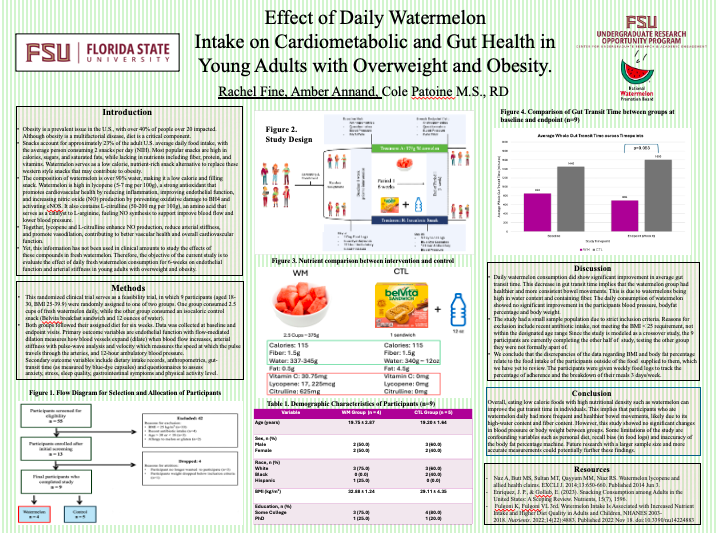Research Symposium
25th annual Undergraduate Research Symposium, April 1, 2025
Amber Annand Poster Session 1: 9:30 am - 10:30 am / Poster #246

BIO
My name is Amber Annand, and I am a sophomore majoring in public health. I hope to pursue my master's in public health and potentially attend medical school. The philosophy of bench-to-bedside research is what initially sparked my interest in research. I love that in the gut biome lab, we are conducting research that can help people live healthier and more fulfilling lives.
Effect of Daily Watermelon Intake on Cardiometabolic and Gut Health in Young Adults with Overweight and Obesity.
Authors: Amber Annand, Cole PatoineStudent Major: Public Health
Mentor: Cole Patoine
Mentor's Department: Department of Health, Nutrition, and Food Sciences Mentor's College: Anne Spencer Daves College of Education, Health, and Human Sciences Co-Presenters: Rachel Fine
Abstract
Obesity is a prevalent issue in the U.S., with over 40% of people over 20 impacted. Although obesity is a multifactorial disease, diet is a critical component.
Snacks account for approximately 23% of the adult U.S. average daily food intake, with the average person consuming 2 snacks per day (NIH). Most popular snacks are high in calories, sugars, and saturated fats, while lacking in nutrients including fiber, protein, and vitamins. Watermelon serves as a low calorie, nutrient-rich snack alternative to replace these western style snacks that may contribute to obesity.
The composition of watermelon is over 90% water, making it a low calorie and filling snack. Watermelon is high in lycopene (5-7 mg per 100g), a strong antioxidant that promotes cardiovascular health by reducing inflammation, improving endothelial function, and increasing nitric oxide (NO) production by preventing oxidative damage to BH4 and activating eNOS. It also contains L-citrulline (50-200 mg per 100g), an amino acid that serves as a catalyst to L-arginine, fueling NO synthesis to support improve blood flow and lower blood pressure.
Together, lycopene and L-citrulline enhance NO production, reduce arterial stiffness, and promote vasodilation, contributing to better vascular health and overall cardiovascular function.
Yet, this information has not been used in clinical amounts to study the effects of these compounds in fresh watermelon. Therefore, the objective of the current study is to evaluate the effect of daily fresh watermelon consumption for 6-weeks on endothelial function and arterial stiffness in young adults with overweight and obesity.
Keywords: Watermelon, Obesity, Gut

